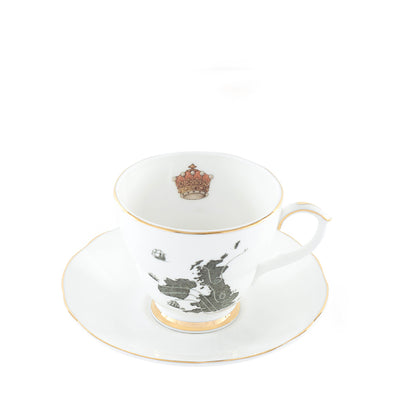The Fascinating Journey of Tea Through History and Culture

In the realm of beverages, tea holds a special place. More than just a soothing drink, tea has been a cornerstone of cultures, ceremonies, and conversations across the globe. This blog post embarks on a journey through the rich history of tea, exploring its ancient origins, cultural significance, and enduring appeal
Ancient Origins:
The story of tea begins in ancient China, around the 3rd century BCE. According to legend, Emperor Shen Nong, known for his knowledge of agriculture and medicine, discovered tea when leaves from a wild tree were blown into his pot of boiling water. This accidental infusion was not only pleasant to taste but was also found to have medicinal properties. Thus began the world's enduring relationship with tea.
Tea Travels the World:
From its birthplace in China, tea embarked on a journey along the Silk Road, reaching Japan by the 9th century. In Japan, tea became more than a drink; it was a spiritual practice, giving rise to the Japanese tea ceremony, a ritualistic preparation and consumption of matcha, a finely ground green tea.
The 16th century marked a pivotal moment in tea history as Portuguese and Dutch traders introduced tea to Europe. Initially a luxury item for the elite, tea eventually became a staple in European households, particularly in Britain.
British Tea Culture:
In Britain, tea found its second home. By the 18th century, it was a popular beverage, and the British afternoon tea tradition emerged during the Victorian era. This social event, characterised by tea served with sandwiches and cakes, became a quintessential British custom.
Global Variations:
As tea spread globally, each region infused it with local flavours and traditions. In India, chai, a spiced tea with milk and sugar, became a beloved beverage. The Middle East favoured strong black teas, often infused with aromatic herbs. In Morocco, mint tea symbolised hospitality, while in Russia, samovars (large tea urns) became a centrepiece for tea brewing.
Modern Tea Trends:
Today, tea culture is experiencing a renaissance. Artisanal teas, tea sommeliers, and a renewed focus on sustainability and fair trade practices are shaping the contemporary tea scene. Tea cafes and specialty stores are becoming social hubs for tea enthusiasts.
Health and Wellness:
Modern science has begun to validate what ancient cultures knew all along – tea is beneficial for health. Rich in antioxidants, tea is linked to numerous health benefits, including heart health, reduced stress, and improved immune function.
Conclusion:
From its accidental discovery to its status as a global phenomenon, tea has been a constant companion in human history. It has witnessed empires rise and fall, sparked trade wars, and inspired cultural practices. As we sip our next cup of tea, let's take a moment to appreciate this timeless brew's journey through time and its ability to connect us across cultures and continents.
And what better way to honour this timeless tradition than by savouring your tea from an Ali Miller teacup? Each sip becomes more than just a part of your daily routine; it turns into an experience, a moment where history, art, and the simple pleasure of tea converge. Ali Miller's fine bone china, adorned with unique, whimsical designs, adds a touch of luxury and story to your tea-drinking ritual, making each cup a celebration of this ancient, yet ever-evolving cultural phenomenon.



